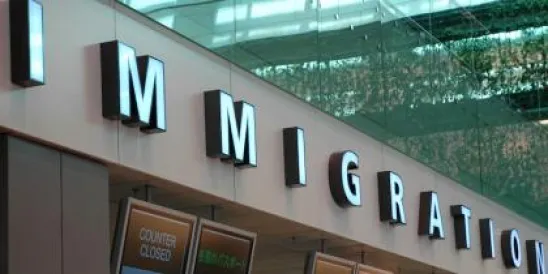In remarks last night, President Obama announced his long-planned executive actions to reform the U.S. immigration system. The President will sign the first of such orders today, despite intense opposition from Republicans in Congress, who believe that the President’s actions are outside the law and contrary to Congress’s authority to legislate federal immigration policy. In his address to the nation, the President argued that executive actions are appropriate and legally justified, and that they are necessary because of Congress’s inaction since the Senate passed a bipartisan, comprehensive reform bill in June 2013.
The President outlined three components of his plan. The most controversial aspect of the program will expand the administration’s deferred action policy, which promises illegal immigrants that they will not be deported if they meet certain criteria and come forward to apply for deferred action. The new program will permit deferred action for immigrants who have been in the United States for at least five years, have children who are citizens or legal residents, pass a background check, and pay a “fair share” of taxes.
The deferred action program, while significant, is far from full legalization for undocumented immigrants currently in the United States. The program would not grant citizenship to undocumented immigrants or even create lawful permanent resident authorizations (i.e., green card). Perhaps most significantly, because the President’s actions are being done under his executive authority, a future president could fully reverse the policy and leave immigrants in the deferred action program – who will have necessarily acknowledged their undocumented status to the federal government – in significant legal limbo.
The other two components of the President’s announced plan would strengthen border enforcement and increase visa access for highly skilled workers. The increased visa access for highly skilled workers has long been a key priority for the business community. A White House fact sheet indicates that the changes primarily relate to regulation of H-1B visa portability, investment visas, training visas for STEM workers, and intracompany L visas. The President, however, was unable to address the single greatest barrier for high-skilled workers – the annual H-1B visa cap – because changes to the cap would require legislation.
As we have previously written, the next big question is Congress’s response. Republicans gained the Senate and strengthened their majority in the House in the last election, and Congress could pass legislation in response to the President’s actions. Congress has significant power to steer the actions of the administration, including blocking executive action with appropriations riders or holding up nominations until the President changes course. Congress will have difficulty seeking to defund the specific actions that the President announced because the U.S. Citizenship and Immigration Services, the agency that would implement many of the changes, is self-funded through fees.
President Obama continued to call on Congress to legislate on immigration. To his critics, he said, “I have one answer: Pass a bill.” Some Republicans have suggested that Congress should reassert its authority over immigration by passing legislation that enacts Congress’s view of reform. Others have suggested a lawsuit to challenge the President’s authority, similar to the lawsuit filed today regarding his executive actions implementing the Affordable Care Act. At present, Republican leaders have warned against suggesting impeachment or a government shutdown, although keeping all Members on message will be difficult.





 />i
/>i
